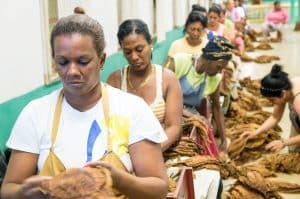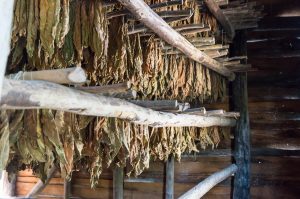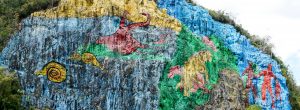
The plantation tour started and ended with an exhaustive two-and-a-half-hour bus ride each way to the farm, but, it was definitely worth the wait.
Our bus could not make the last leg of the journey to the farm because it was such a small road, so after waling for a ¼ mile or so through a neighborhood of the homes of the farm workers, we were greeted by the woman whose family runs the farm.
She first took us into the main tobacco field where she explained that the workers were currently trimming the seed pods off of tops of the plants so they do not go to seed, this way they can control exactly what tobacco plants grow there. These plants weren’t as tall as others I have seen but they were very healthy. The tops of the leaves were smooth as cotton, and bottoms were actually a little wet and sticky feeling. They let us wander through the fields for a while and get a feel for the farm. It was quite beautiful and everyone was working hard. Everything on the farm was so healthy and vibrant.

Our second stop was a tobacco processing center, for lack of a better word (they may have one, but I didn’t catch it). They took us through each stage of the pre-rolling stages of the tobacco before they make their way to the factories. Each leaf of tobacco is sorted, stripped, and bunched in one room, according to color and thickness.
After a quick snack that was waiting for us that consisted of mostly fresh fruit and some juice, they showed us to the drying barn where they had bunches of leaves hanging from every surface of the inside, ceiling to floor about two stories tall in total. The leaves still feel soft and pliable at this point, but nowhere near as the plants growing. The leaves were a gorgeous reddish brown and the smell was amazing. I could live in this room.

The next stage is the first fermentation where is sits it large pylons for a few weeks until it is once again taken apart and shaken around to air it out. It is then packed tightly by the weight of the workers into huge cubes made out of palm tree bark and fermented again. After that it is once again broken apart, fermented in larger piles, then packed up in burlap sacks and shipped off to the factories.
The last part of our day was a late and long lunch next to a huge mountain face that was painted some 30 years ago. I’ll let you decide its artistic merit… We were then presented with a couple Habanos Cigars and yet another roasted pig, Cuban beer, and of course, some Mojitos.

It was a really great experience traveling through these farm villages and seeing how the people live and work. The farms are really a self-contained city that has everything everyone needs to live and work. Quite remarkable. I think in another life, I could have done this.





